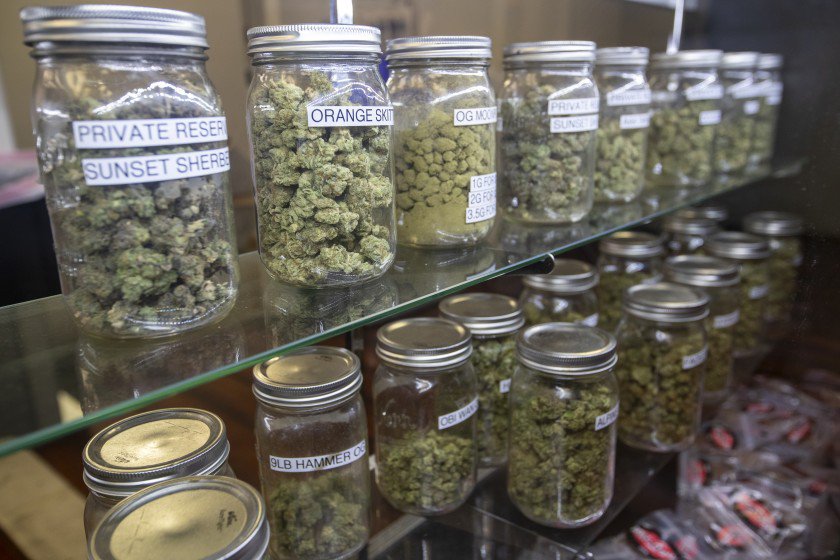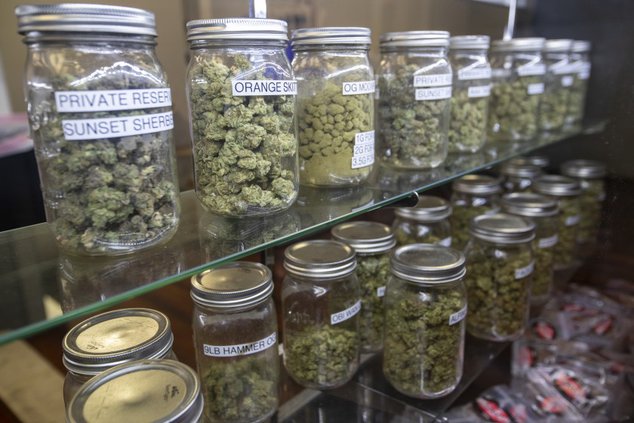Manteca’s streets are not going to be repaved with Acapulco Gold.
That’s a more flippant way to characterize an astute observation by Charlie Halford.
Halford has a somewhat different perspective on the proposal to legalize storefront marijuana sales in Manteca than his City Council colleagues.
It comes not from his extensive involvement in community activities that dovetail with Manteca’s municipal motto being “The Family City’. It comes from having served nearly 30 years in law enforcement including a stint as Manteca’s police chief before retiring.
It goes without saying Halford views marijuana much like the majority of his law enforcement colleagues. Marijuana, from where he stands, is no different than beer. It is a gateway drug.
Do not misconstrue what is meant by “gateway”. It doesn’t mean everyone — or even the majority — who inhales or guzzles graduates to meth or hard liquor. It simply means it opens the door.
That is significant door to potentially open as any police officer, social worker or even lawyer can tell you. Alcohol addiction can kill. And that’s just not the user. Look at the number of people killed by drunk drivers or those who lose their lives or are maimed by those in a drunken rage.
Alcohol tears apart families, leads to mental and health issues, and is costly financially.
The same rings true of drug addiction.
Marijuana impairs motor skills and reaction time just like alcohol. It might not be at the same intensity but the more prevalent the use of pot becomes, the more marijuana abuse will surface as a contributing factor to societal ills as well as health and safety issues. It might not reach the same level as alcohol abuse but it is still a problem.
Getting hooked on more severe drugs and the mayhem and destruction on society and lives exceeds that of hard liquor.
That said the barn door was opened long ago.
Halford is not naive enough to believe that you are going to stop marijuana use by banning legalizing storefront sales in Manteca.
Instead his point is simple: Anyone who thinks allowing legal marijuana storefront sales in Manteca and then taxing it into oblivion is going to address reducing the black market, crime, as well as environmental destruction associated with it, are wrong. And because of that, one of Proposition 64’s promises when it was passed by voters on 2016 was that legalizing marijuana would assure the pot being sold was tested and wouldn’t be laced with pesticides and other health damaging substances is not being obtained to the degree it was inferred.
This brings us to the snake oil component of the siren song Proposition 64 supporters serenaded those on the fence in their successful bid to legalizr marijuana and its sale for everyone over 18 years.
Marijuana sales, as Halford characterized earlier this month at a council meeting, “is not the golden goose” it was made out to be.
Simply put, it likely will not generate game changing revenue that will allow the city to figuratively replace Manteca’s deteriorating streets on the back of Acapulco Gold sales.
Halford has made it clear he is not diametrically opposed to the city allowing storefront pot sales but is quick to add it’s going to take a lot of convincing for him to join Mayor Ben Cantu in embracing bringing retail marijuana sales to Manteca.
Tax it too much, and you defeat the purpose of regulating it for health reasons.
Tax it too much, and you are likely to strengthen black market sales instead of diluting them.
Halford believes if you legalize the sales, you need to keep taxes roughly to the level needed for the city to cover costs of regulating sales or else you simply re-enforce the black market where virtually all of the criminal activity takes place.
That is not the view that others on the council embrace.
They see dollar signs.
That’s bad news as Sacramento saw the dollar signs first.
The state slaps a 15 percent excise tax on transactions between wholesalers and retailers. That is in addition to the point of sales tax starts at 7.25 percent and goes as high as 10 percent depending upon the legal jurisdiction.
This is on top of the higher costs for establishing a regulated and environmentally compliant grow operation that experts indicate is at least five times higher than illegal grows.
Then there are the 5 to 15 percent pot taxes local jurisdictions can add.
Yes, there is more tax revenue flowing in. Sacramento in 2019 took in about $288 million from legal sales pegged at $3.1 billion. This is against black market sales estimated at $8.7 billion in 2019.
Tacking on taxes beyond what covers the city’s expenses in regulating storefront sales isn’t really necessary to increase the flow of revenue to help pay for day-to-day municipal services. That’s because the city gets one cent of the 7.75 percent sales tax collected. They also get a half cent on every $1 transaction in public safety tax to help fund frontline police and fire services.
Cantu might agree on this point as he repeatedly emphasized earlier this month that be believed retail pot sales should be treated just like any other retail business the city regulates. He used pharmacies as an example.
All of that needs to be kept in mind after the City Council — based on what they assure will be robust community feedback opportunities — answers the first question of whether they should allow storefront retail marijuana sales.
The second question, if the first gets an affirmative vote, is to determine the level of local marijuana taxes.
Whether the council approaches the issue as two-part question has everything to do with how transparent and/or honest they are willing to be with the public.
For too long those who have had reservations about legalizing marijuana sales have been sold the big lie that it taps a tax Mother Lode that will take pauper municipal budgets to Champagne levels.
That is why the only question that should be answered to determine if storefront marijuana sales should be legalized is whether it makes sense for the community.
It would be disingenuous to inhale the mellow promise of loads of money before making a clearheaded decision.
This column is the opinion of editor, Dennis Wyatt, and does not necessarily represent the opinions of The Bulletin or 209 Multimedia. He can be reached at dwyatt@mantecabulletin.com









